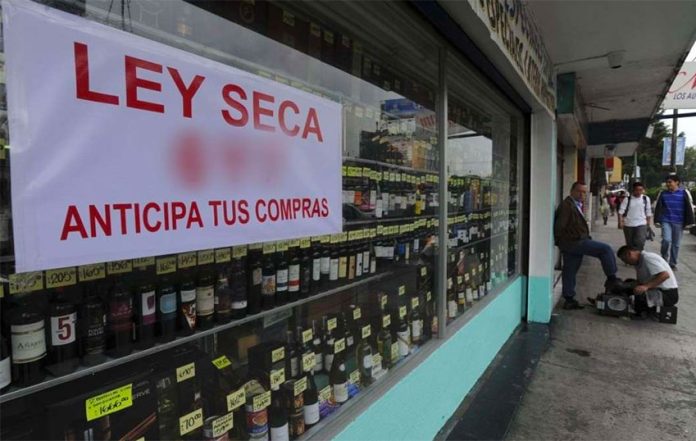I don’t know about y’all, but I could really use a beer.
Enough people have felt like this lately to warrant the seeking out of things much stronger than beer in the face of varying degrees of “dry laws” around the country, as evidenced by the number of deaths and hospitalizations from tainted, “bootleg” spirits around Mexico.
Plenty of people decided pretty much immediately that they would circumvent the law, and plenty of out-of-work and possibly bored amateur producers were more than happy to meet the new demand. The efforts to prevent alcohol consumption would be laughable if they weren’t so blatantly sad.
In my own city of Xalapa, Veracruz, the sale of alcohol has been restricted to between the hours of 12:00 p.m. and 5:00 p.m., Monday through Thursday. If you’re at the store at 5:30 p.m., as I have found myself for the past couple of weeks hoping to score a bottle of cabernet, you’re out of luck (related side note: Mexico produces some excellent wine. Like, really good).
It would, of course, be hard to argue that the consumption of alcohol helps things very much. The evidence is overwhelming that alcohol is involved in all manner of social sins, from domestic violence and full-on homicide to smaller annoyances like nonsensical slurred speech or holding your drunk friend’s hair back while she cries and vomits all over the place. If we’re looking for an innocent scapegoat, we’re not going to find it in mezcal.
But kind of sort of restricting the sale of it sometimes in some places is sure a half-hearted effort at reducing violence if I ever saw one. Even China, with its iron grip on things as personal and minuscule as the day-to-day behavior of its citizens, would have to organize and mobilize its gigantic social control machine for days before implementing something like that.
And if there’s one thing I’d bet a million dollars on, it’s that Mexico is no China.
My main question here is this: did anyone really think this through in a deep, serious way? It feels like something that’s just for show, possibly a way to get skeptical people to understand the gravity of the situation we’re in, a way for the government to say, “See? We’re doing something!” at an unprecedented time of uncertainty.
The arguments I imagine (which we all must do as very little in the way of explanation was given) are the following:
- Perhaps the restrictions of times and days will prevent last-minute impulse buys of alcohol that could be consumed at ill-advised impromptu parties. A full ban, as some places instituted, would ensure the prevention of these get-togethers even more. This is a quarantine, people!
- Continuing to permit a behavior that lowers people’s inhibitions during a time we need to exert more self-control than ever just seems like a recipe for disaster.
- Maybe people having less access to alcohol in general will reduce the incidence of domestic violence in the home, where many are cloistered and stressed together.
- Something-something-keeping-immune-systems-strongish-something-something?
As always, I’ve got some “buts:”
- If there’s one thing we’re good at in this country, it’s planning parties in advance. Even in the face of a complete ban, we will definitely figure something out. Not to mention it presents just the perfect opportunity for daring and fun macho posturing: “Oh, you say we can’t get alcohol? Challenge accepted.”
- Control is an illusion, especially here. I mean, we can’t even keep people from murdering or stealing from each other. With over 95% of criminals totally getting away with whatever crime they commit, it’s hard to imagine anything but a collective eye roll in response to a paternalistic “really, now, behave yourselves!”
- This, to me, is the most reasonable explanation and justification for a ban, because it’s true: alcohol often is involved in domestic violence cases. Suddenly — at least for those actually obeying quarantine rules — families are together much of the time and stressed much of that time, many as they watch their bills pile up and income dwindle in the face of much-less-than-impressive “stimulus” loans. I’m sad to say, however, that domestic violence would continue to be a problem without any alcohol or drugs, as it’s a cultural problem … not just one that pops up when people are under the influence of some kind of substance that alters behavior.
- I think experience has proven that people will do whatever they want with their own health, and to a large extent, that of their families.
Banning alcohol, I think history has proven, is not typically an effective strategy. Rather than a futile, half-hearted exercise, why not focus our efforts on trying to reduce violence and stress in society in general? I don’t know, say, a daily (or maybe hourly at this rate) meditation and relaxation program on public radio paired with things that actually help people reduce their stress levels, like direct cash handouts so people can stay afloat while we’re in economic free-fall but still expected to pay for everything like we did before.
All I know is that a beer or a glass of wine (or a shot of tequila or mezcal — pick your poison) can really help take the edge off. Plus, there are so many things we can’t do suddenly. At least let us have a beer in our living room. Geez.
Sarah DeVries writes from her home in Xalapa, Veracruz.
